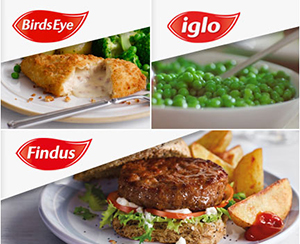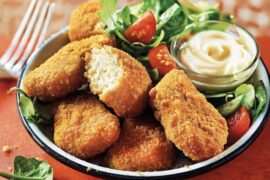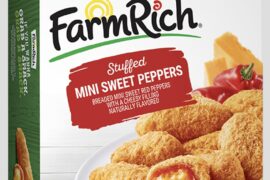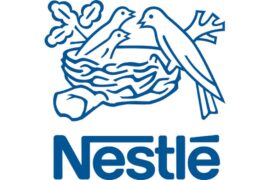Nomad Foods Limited has reported sales of €547.1 million for the first quarter of 2016, resulting in a €42.2 million profit after tax, which includes exceptional items of €23.1 million. Earnings per share were €0.23, compared to a loss of €2.89 per share in the quarterly period ending on March 31, 2015.
The Feltham, England-based company’s portfolio of frozen food retail brands in Europe includes Birdseye, Iglo and Findus. It makes, markets and distributes products ranging from vegetables and fish to poultry and ready meals in 17 countries, and has the leading market share among brand players in Western Europe. Ten company-owned manufacturing plants currently produce the extensive line, though the Findus flagship factory in Bjuv, Sweden, is scheduled to cease operations by the end of this year.
 In an earning conference call to investors on May 25, CEO Stéfan Descheemaeker and CFO Paul Kenyon detailed the latest financial results as follows:
In an earning conference call to investors on May 25, CEO Stéfan Descheemaeker and CFO Paul Kenyon detailed the latest financial results as follows:
- Revenue for the three months ended March 31, 2016 decreased by €23.7 million, or 4.2%, compared to turnover of €570.8 million for the same period in 2015. Adjusting for currency impacts, the exit from Russia, an additional trading day in Q1 2016 due to the leap year and the business acquisition of La Cocinera in Spain, the like for like decline was 6.1% – a 0.9% improvement on the rate of decline in the fourth quarter. As has been the case in the past few quarters, the fall in sales was driven by disappointing performances in Nomad’s three largest markets – the UK, Italy and Germany. However, each of these markets again showed reduced rates of decline year-on-year compared to the prior quarter.
- As adjusted gross profit for the three months ended March 31, 2016 declined by €11.2 million, or 6.3%, to €167.5 million from pro forma as adjusted gross profit of €178.7 million for the three months ended March 31, 2015. The decrease was primarily driven by lower sales volumes.
- As adjusted gross margin for the three months ended March 31, 2016 declined by 0.7% to 30.6% from the pro forma as adjusted gross margin of 31.3% for the three months ended March 31, 2015. This was primarily due to a slightly adverse product mix and the dilutive effect of the La Cocinera acquisition.
- As adjusted EBITDA for the three months ended March 31, 2016 decreased €6.0 million, or 5.7%, to €99.6 million from pro forma as adjusted EBITDA of €105.6 million for the three months ended March 31, 2015. This was attributed to the reduction in gross profit, which has been partly offset by lower advertising and promotion expenditure as the company re-phased advertising spend to align with the anticipated launch of the new advertising and lower indirect costs year-on-year due to synergy realization and benefits from Nomad’s lean reorganization program. EBITDA as a percent of as adjusted revenue for the three months ended March 31, 2016 fell 0.3% year-on-year to 18.2%.
- As adjusted profit for the three months ended March 31, 2016 decreased €5.4 million, or 9.3%, to €52.8 million from pro forma as adjusted profit of €58.2 million for the three months ended March 31, 2015.
- As adjusted basic and diluted EPS is €0.29 for the three months ended March 31, 2016 as compared to pro forma as adjusted basic and diluted EPS of €0.32 for the three months ended March 31, 2015, a decrease of 3 Euro cents year on year, or 9.4%, due to the decrease in as adjusted profit.
Management Comments
“We managed to successfully slow the rate of sales decline for the second successive quarter amidst challenging market conditions, while maintaining margins and cash generation consistent with our internal outlook,” said CEO Descheemaeker. “As we continue to implement our strategy and our actions reach the marketplace in the second quarter and through the balance of the year, we expect progressive quarterly improvement to the top line trend.”
Among challenging market conditions listed by the company was strong price competition in Norway from companies sourcing fish in Norwegian krone. It has fallen in value against the US dollar, the currency in which most internationally sourced seafood raw material is priced.
Other factors included the bankruptcy of a major customer in Austria, and ongoing pressure from private label producers. On the private label front the Netherlands was cited in particular, as prices have been slashed there for frozen fish fingers and spinach.
Notwithstanding the heat of today’ buying and selling climate, Descheemaeker commented: “We remain highly confident of delivering our forecast synergies from combining the Findus and Iglo businesses, and I am pleased with our progress to date on both integration and footprint consolidation. Optimizing our factory footprint is a critical part of achieving our objective of being a lean manufacturer and the consultation process regarding our Bjuv plant remains on track. We are committed to long-term value creation and I am encouraged with our team’s hard work and progress.”
During the question and answer session of the earnings call an analyst asked if, given the trend line, shareholders could expect the sales decline to be reduced to 3% for the year.
Responding that it would be presumptuous at this stage to make a guess, while noting that the rate of decline has fallen appreciably in Italy, Descheemaeker stated: “We are very focused on consumers, and at the end of the day consumers will decide. The long and short of it is that we are not changing our forecast, and will focus more than ever on our strategy. We are not going to cut corners.”
Potential “Brexit” Impact
Another analyst, referring to the so-called “Brexit” referendum on June 23 that will decide if the United Kingdom will stay in or leave the European Union, asked for a comment on how the result could affect Nomad Foods.
“We have planning in place for it,” said CFO Kenyon. “Obviously there would be currency volatility for sterling, and possibly for the euro as well. We have hedged this for this next year.”
Should voters approve departure from the EU, noted Kenyon, there would be a two-year period to renegotiate trade agreements. “If tariffs are erected,” he added, “we may have to put a fish processing plant in the UK.”
Meanwhile, in a statement released before the earnings call, Noam Gottesman, Nomad Foods’ co-chairman and founder, expressed satisfaction about the company’s direction.
“We continue to believe that Stefan and the whole Nomad team have identified the correct strategy and are making the right decisions,” said Gottesman. “We are encouraged by a number of early wins and pleased with our progress to date. While our immediate priority remains stabilizing our top line, we continue to build and improve upon our strong foundation to support long-term value creation.”
As this story was being filed shortly after noon on May 25, Nomad Foods stock was trading at $10.03 per share. That was up by 1.34% from the day before, but still less than half of the 52-week high point quote of $22.25.





